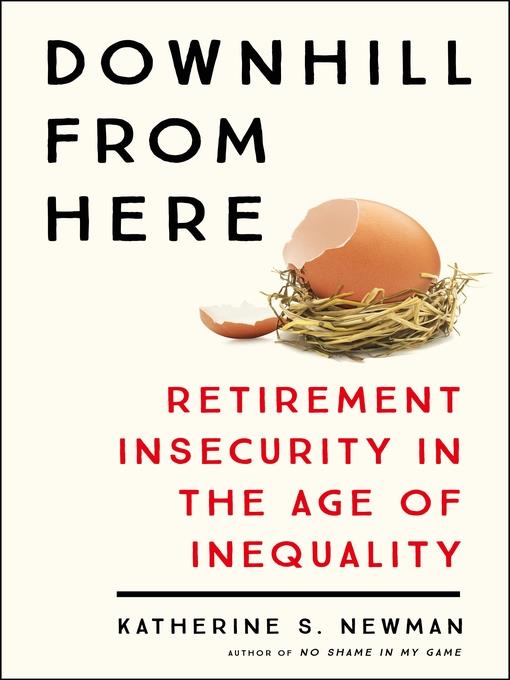
Downhill from Here
Retirement Insecurity in the Age of Inequality
فرمت کتاب
ebook
تاریخ انتشار
2019
نویسنده
Katherine S. Newmanناشر
Henry Holt and Co.شابک
9781250119476
کتاب های مرتبط
- اطلاعات
- نقد و بررسی
- دیدگاه کاربران
نقد و بررسی

December 1, 2018
A clear presentation of the retirement problem in the United States, shown through the stories of diverse individuals whose insecurity reveals a shredding of the fabric of American life.Newman (Sociology/Univ. of Massachusetts, Boston; The Accordion Family: Boomerang Kids, Anxious Parents, and the Private Toll of Global Competition, 2012, etc.), a sociologist who has been examining the lives of working Americans for many years, turns her attention to five groups: blue-collar workers, skilled private-sector workers, public-sector workers, employees past the age of retirement, and younger workers (mostly millennials). For each category, besides giving her own analysis, the author lets representative individuals speak in their own words. The picture they paint is not pretty. Newman's first focus is the Teamsters, whose pension funds are running dry. Next, the author scrutinizes Verizon and United Airlines and their treatment of longtime workers. "While the Teamsters focused their ire on politicians, the Treasury Department, and Wall Street," writes Newman, "Verizon and United retirees tended to direct their moral critique at company management." In her chapter on public-sector employees, the author singles out Detroit as an example of the fate of civil service pensions when a city declares bankruptcy. The stories of "gray labor," retirement-age workers who cannot afford to retire, is especially disheartening, and then there are the younger workers, trying to fund their own retirement plans and for whom Social Security benefits are a fading dream. Of special interest is Newman's comparison of how retirees fare in two American cities: Opelousas, Louisiana, which has the nation's highest rate of elder poverty, and Ogden, Utah, which is populated by well-protected retirees. Similarly, the author looks at Denmark, Netherlands, and Australia, countries that provide security to their retirees, seeking ideas to help ease America's retirement crisis.The stories sometimes drag, but the facts are undeniable and well-presented, and the message is clear.
COPYRIGHT(2018) Kirkus Reviews, ALL RIGHTS RESERVED.

December 1, 2018
A solid pension and guaranteed Social Security payments were once anticipated by most retirees. But the 2008 recession, mismanagement of funds, and rising health-care costs have put both in jeopardy. Sociologist Newman delves into the uncertainty confronting today's retiring workers, using personal stories to explore the problems faced by blue-collared Teamsters, white-collared United Airlines workers, and Detroit's municipal employees. She warns that many of these funds have been tapped for other uses, and with the baby boomers living longer and fewer younger workers paying into pensions, few of them are sustainable. Older workers are fighting back by staying on jobs longer or working part-time to supplement income, but many, especially those less well educated and poorer, are having difficulty coping. Newman notes that secure retirement is aided by supporting institutions as she compares the plight of retirees in struggling areas in Louisiana to those in Ogden, Utah, where the Church of Jesus Christ of Latter-day Saints provides needed aid. This well-argued study offers a broad look at the insecurity threatening generations to come and possible solutions to this complex issue.(Reprinted with permission of Booklist, copyright 2018, American Library Association.)

Starred review from December 1, 2018
In America, workers expect to be rewarded for their long years of productivity by the comfort and security of retirement. But companies, governments, and entire industries have cut back on pension benefits, the 2008 housing crisis decimated home equity, and millions of low-income American workers have no significant assets, no employer-provided retirement benefits, and no savings at all. Newman (No Shame in My Game) investigates the plight of blue collar laborers, white collar managers, and municipal employees, finding that the broken promise of retirement cuts across sectors. She shares distressing stories of under-compensated retirees and members of a labor force too poor to retire, but also notes that pension reductions and other cutbacks may have the gravest impact on younger individuals still in the workplace. Paired chapters contrasting impoverished Opelousas, LA, and middle-class Ogden, UT reveal striking similarities and vastly different outcomes between these two communities that share faith-based and familial connectivity, but diverge in policy, infrastructure, and the ravages of generational poverty and institutional racism. This bleak but not hopeless exploration concludes with a succinct call for pension reform. VERDICT Strongly recommended for policymakers, business and nonprofit leaders, and general readers concerned (and who isn't?) about their retirement.--Janet Ingraham Dwyer, State Lib. of Ohio, Columbus
Copyright 2018 Library Journal, LLC Used with permission.

December 1, 2018
A prolific author whose No Shame in My Game won the Robert F. Kennedy Memorial Book Prize and Sidney Hillman Foundation Book Award, Newman reflects on the retirement crisis facing us all, from white-collar workers who have lost their home equity to Teamsters with sliced pensions to Generation Xers who believe they will never retire. Meanwhile, the average Social Security check doesn't begin to cover preretirement wages, and almost half of households with people aged 55 and older have no retirement savings at all.
Copyright 2018 Library Journal, LLC Used with permission.

























دیدگاه کاربران